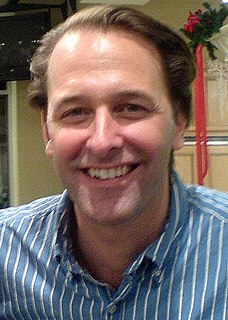Top 128 Proteins Quotes & Sayings - Page 3
Explore popular Proteins quotes.
Last updated on April 15, 2025.
It is, I believe, justifiable to make the generalization that anything an organic chemist can synthesize can be made without him. All he does is increase the probability that given reactions will 'go.' So it is quite reasonable to assume that given sufficient time and proper conditions, nucleotides, amino acids, proteins, and nucleic acids will arise by reactions that, though less probable, are as inevitable as those by which the organic chemist fulfills his predictions. So why not self-duplicating virus-like systems capable of further evolution?
We all come into existence as a single cell, smaller than a speck of dust. Much smaller. Divide. Multiply. Add and subtract. Matter changes hands, atoms flow in and out, molecules pivot, proteins stitch together, mitochondria send out their oxidative dictates; we begin as a microscopic electrical swarm. The lungs the brain the heart. Forty weeks later, six trillion cells get crushed in the vise of our mother’s birth canal and we howl. Then the world starts in on us.
If you could choose to master a single ingredient, no choice would teach you more about cooking than the egg. It is an end in itself; it's a multipurpose ingredient; it's an all-purpose garnish; it's an invaluable tool. The egg teaches your hands finesse and delicacy. It helps your arms develop strength and stamina. It instructs in the way proteins behave in heat and in the powerful ways we can change food mechanically. It's a lever for getting other foods to behave in great ways. Learn to take the egg to its many differing ends, and you've enlarged your culinary repertoire by a factor of ten.
We can now determine, easily and relatively cheaply, the detailed chemical architecture of genes ; and we can trace the products of these genes ( enzymes and proteins ) as they influence the course of embryology . In so doing we have made the astounding discovery that all complex animal phyla - arthropods and vertebrates in particular - have retained, despite their half-billion years of evolutionary independence, an extensive set of common genetic blueprints for building bodies.
Originally, the atoms of carbon from which we're made were floating in the air, part of a carbon dioxide molecule. The only way to recruit these carbon atoms for the molecules necessary to support life-the carbohydrates, amino acids, proteins, and lipids-is by means of photosynthesis. Using sunlight as a catalyst the green cells of plants combine carbon atoms taken from the air with water and elements drawn from the soil to form the simple organic compounds that stand at the base of every food chain. It is more than a figure of speech to say that plants create life out of thin air.
How do you know what's really organic? Today, there's all these impurities in the water and the air. The water for the fruits and vegetables has junk in it. If you get enough vitamins and minerals out of normal food and whole grains, and you get enough proteins and exercise (that's the key) then nature builds up a tolerance to all of these things. It's survival of the fittest. You can't have everything perfect, that's impossible, but the fit survive.
There are thousands of proteins in the cells, some of them very large chains of molecules. And the cell doesn't function if one of those chains of molecules isn't there, and you start looking at the complexity of life and the mystery of life, and then start thinking about things like the twenty universal constants, that if any one of them from Plank's minimum to the mass of a proton, if one of them is the tiniest bit off, there would be no life or possibility of it in the universe.
We may, I believe, anticipate that the chemist of the future who is interested in the structure of proteins, nucleic acids, polysaccharides, and other complex substances with high molecular weight will come to rely upon a new structural chemistry, involving precise geometrical relationships among the atoms in the molecules and the rigorous application of the new structural principles, and that great progress will be made, through this technique, in the attack, by chemical methods, on the problems of biology and medicine.







